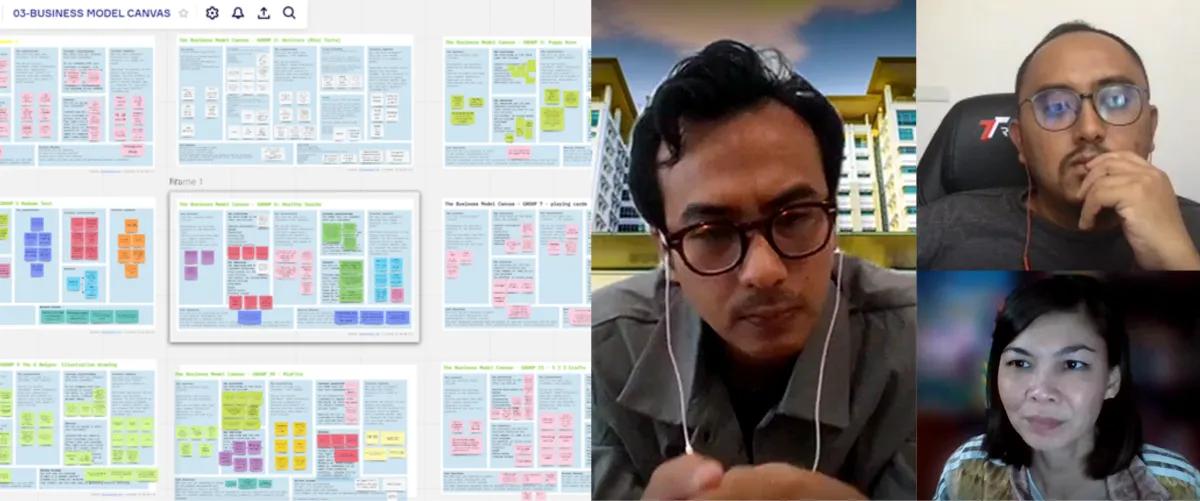Using Experience in Teaching Design Enterprise
“We learn by example and by direct experience because there are real limits to the adequacy of verbal instruction.”
― Malcolm Gladwell, Blink: The Power of Thinking Without Thinking
What was said by Malcolm Gladwell in the quote above is within the realm of the Constructivism pedagogical approach – it is a learning paradigm which suggested that humans develop their knowledge through direct experience rather than being taught concepts in the abstract.
In entrepreneurship curricula, hosting a guest speaker in the classroom is one of the most ubiquitous approaches; guest speakers share their personal experiences and journey in entrepreneurship, and later in the session have an active discourse with the students on the areas specifically related to their class's projects. Providing the opportunity to interact with industry practitioners would bridge the gap between the student’s classroom learning and their real-world experiences. This is imperative in preparing the students to hit the ground running.
In confronting continual upheavals caused by the COVID-19 pandemic, the author, as the lecturer for the BDC2614 Design Enterprise module planned a series of lessons that integrate experiences from industry guest speakers and collaborative online learning experience.
Guest Speaker 01 – Mr Izzat Fadzil (Enterprise Development, MRANTI)
The first guest speaker was Mr Izzat Fadzil, a manager for enterprise development from MRANTI (previously known as Malaysian Global Innovation & Creativity Center, MaGIC) shared about MaGIC’s initiatives for developing sustainable entrepreneurship ecosystem in Malaysia. In this session, Mr Izzat shared about their programmes, efforts in facilitating, navigating, and enabling the ecosystem to position Malaysia as an emerging innovation nation. In this 1 hour and 30 minutes session, Mr Izzat shared his experience in guiding young entrepreneurs from local universities with capacity-building programmes, market & funding possibilities, and regulatory help to its community of start-ups, investors, and ecosystem participants, affecting over 100,000 aspiring and seasoned entrepreneurs and generating RM1.9 billion in value.
Guest Speaker 02 – Dr Yasmin Rasyid (Founder, EcoKnights)
Dr Yasmin Rasyid facilitated the second session and shared her life experiences on building sustainable communities with EcoKnights, which she founded in 2005, as well as her role as the sustainable director at Lendlease. The discussion in this session centred on social entrepreneurship, which was accomplished through legislative advocacy, on-the-ground and hands-on community activities, corporate collaborations, youth volunteerism, strategic engagements, and fundraising. Dr Yasmin shared her business philosophy, and tips on dealing with frictions between different generations, as well as taking questions regarding the financial sustainability of social entrepreneurship practice.
Miro
In a hybrid class setting, other than the guest speakers and passive learning activities like a standard lecture (in class and streamed on Blackboard) the class activities were shifted to heavily utilize online collaborative tools. Students were given case studies, scenarios to solve, and templates for them to discuss among themselves and share with other groups in the same class at the end of the discussion. This way, while actively learning and brainstorming among themselves, they will also learn from their peers from different groups. Topics like Business Model Canvas for example, were explained to them beforehand and students later will collaborate and fill up templates based on their group’s business plan. This was done in Miro – a free-to-use, very powerful, most intuitive online collaborative whiteboard platform for distributed teams.
Miro didn’t just allow them to have an online collaborative tool, it also allows the activities to be guided and monitored by the facilitator without having to break them into isolated groups. In one other class activity, the students were given hypothetical seed funding to plan for activities that can generate profit in two hours. All 11 groups were given different amounts of seed funding which range from RM5-RM20. The objective of this activity is to get them to work within those two very limiting parameters (essentially almost no capital to start with, and only two hours of activity to try to gain profit out of it). Certain groups managed to think of a simple business plan to maximize their profit margin in two hours. Others offered fun illustration services, while some others managed to plan activities that tripled the amount of their seed funding without using it.
Experience
While physical class activities are still limited, the potential of having online experience can be further explored in delivering entrepreneurship-related modules like Design Enterprise. On top of the theories and concepts that the students must learn in class, the student’s own learning experience can be enriched with the real-life experiences shared by the guest speakers and utilising the collaborative tool to imitate real-life experiences in collaborating with classmates.
Just like Julius Cesar once said, “experience is the teacher of all things”.
Mohd Firdaus bin Mohd Anuar
School of Arts
Email: @email




